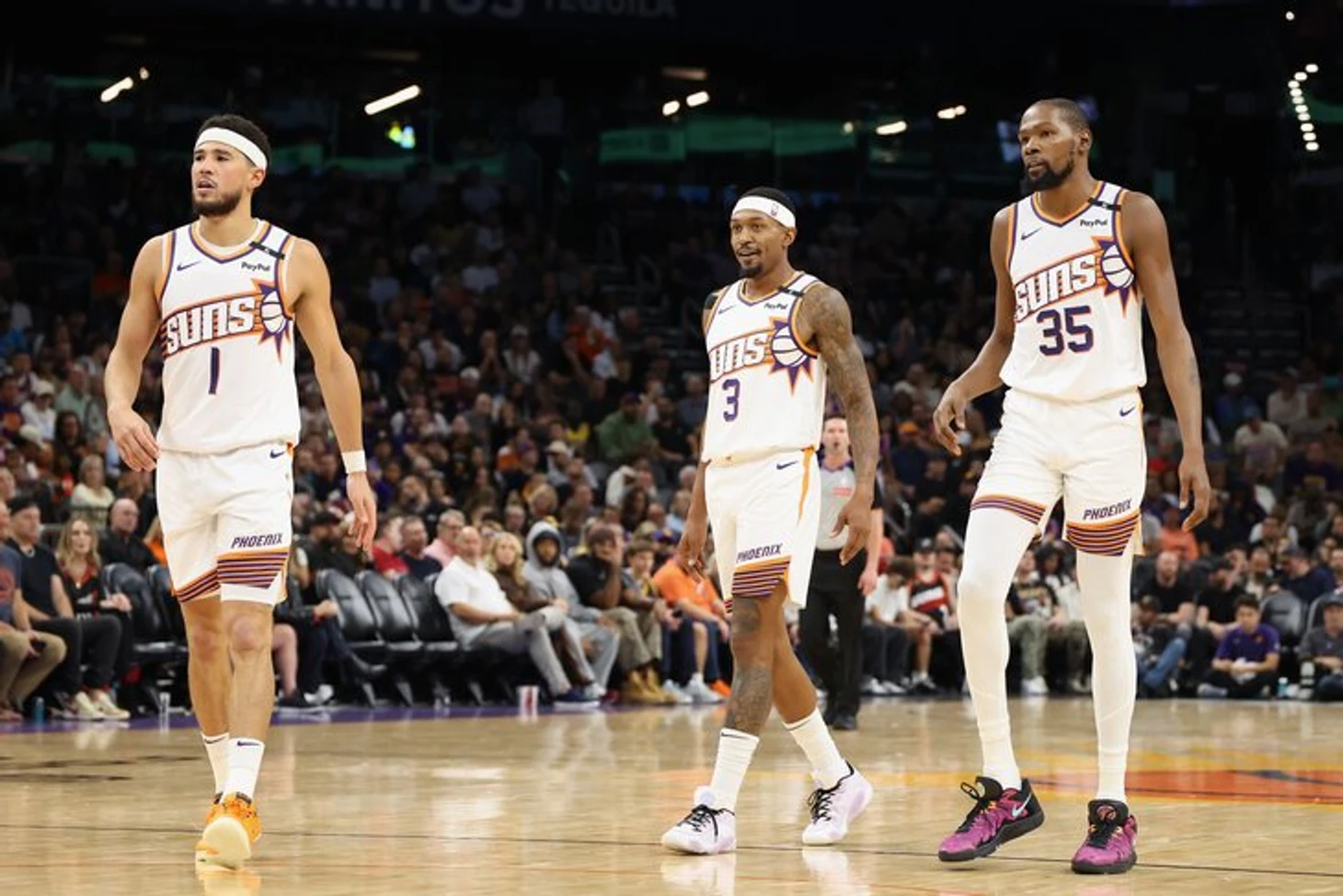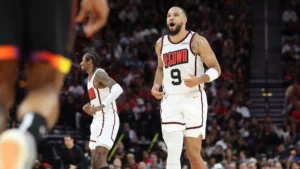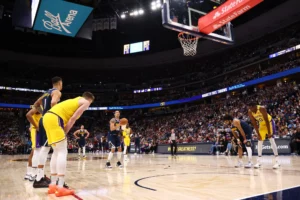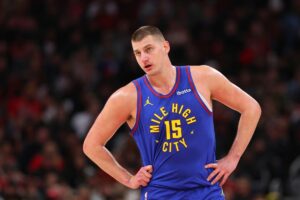The Most Expensive Roster in NBA History ($215M) Fails to Make the Playoffs – What’s Wrong with the Phoenix Suns?
When three superstar names come together in one team, it’s easy to assume they’re destined for success—regardless of how many times history has proven otherwise. The Phoenix Suns, featuring Kevin Durant, Devin Booker, and Bradley Beal, may not have been overwhelming favorites for the NBA title in 2025, but they were at least expected to be contenders. Instead, they find themselves on the brink of one of the biggest failures in NBA history.
Last season, the Suns made the NBA playoffs as the No. 6 seed, only to be dismantled by the Minnesota Timberwolves, led by the young and fearless Anthony Edwards. That was already a disappointing result for a team with championship aspirations, but compared to this season, it almost looks respectable.
With just 14 games left in the NBA regular season 2025, the Suns sit at 31-37, outside the NBA Play-In Tournament at the 12th seed in the Western Conference. For a team that was built to compete for a championship, this is a catastrophic failure. For the most expensive roster in NBA history, it’s an even bigger disaster.
A Defense Lacking Identity – A Problem That Can’t Be Fixed
Before last year’s NBA playoffs, Anthony Edwards was mocked for saying, “They have Kevin Durant, but we have Jaden McDaniels.” However, in the playoff series against Minnesota, the Suns desperately lacked a defensive specialist like McDaniels—and that problem persists this season.
Phoenix ranks 27th in the NBA in defensive rating, allowing 116.8 points per game. Only the worst teams—Washington Wizards, New Orleans Pelicans, and Utah Jazz—are worse defensively. This is shocking for a team that built a superteam to win a championship.
The biggest issue? Transition defense. The Suns allow 17.2 fast break points per game, ranking third-worst in the NBA, alongside the Wizards and Trail Blazers.
Phoenix’s poor defense was made worse by questionable roster decisions. They traded Toumani Camara, who has become an elite defender with Portland, and Deandre Ayton, their former No. 1 pick and a key interior presence. Ayton may have been expensive, but he anchored the paint. Meanwhile, Jusuf Nurkić, who replaced him, has been a liability. With Nurkić on the floor, the Suns have a -2.8 net rating, compared to just -0.1 when he sits.
At this point, Kevin Durant is the team’s best defender at 36 years old. Asking him to be the defensive anchor is completely unrealistic. The Suns bet on an elite offense covering their defensive struggles, but instead, they’ve ended up with an average offense and an abysmal defense.
And the problems aren’t just in the numbers.
The Suns’ defensive communication is non-existent. Opposing teams drive to the rim effortlessly, while Phoenix defenders constantly misread assignments—either getting lost or overcommitting in help defense, leading to open shots.
The biggest issue isn’t just the lack of defense—it’s the lack of leadership, leading to complete chaos on the court.
An Offense That Was Supposed to Be Unstoppable—But Isn’t
“I don’t know how teams are going to guard us.” That’s what Devin Booker said before last season. But as we’ve seen, the Suns’ offense hasn’t been the unstoppable force many expected.
The Durant-Beal-Booker trio has a negative net rating (-0.8). While Booker and Durant together have a +1.2 net rating, Beal simply hasn’t fit in—posting a -3.6 net rating with Durant and -3.5 with Booker. This is not what the Suns envisioned when making their blockbuster trades.
The Suns’ pace is slow, ranking 20th in the NBA with 98.69 possessions per game. Given their defensive struggles against transition offense, they aren’t able to outrun opponents who play a high-tempo style.
In close games, Phoenix hasn’t been terrible—19 of their 36 wins have come in clutch situations. But for a team with multiple All-Stars, former MVPs, and NBA Finals experience, this record is underwhelming.
One of the most glaring issues is the lack of a true playmaker. A few years ago, Chris Paul was the team’s orchestrator, guiding them to the NBA Finals. Without him, the offense often looks disjointed. The Suns tried to fix this by acquiring Tyus Jones, but he isn’t the solution—they need a true floor general.
Instead, Phoenix’s offense relies heavily on isolation. Durant, Booker, and Beal all take a high percentage of their shots off the dribble.
- 45% of Durant’s shots come from pull-ups, and just 21.8% are in the paint.
- Beal (37.7%) and Booker (52%) also take a high volume of pull-up jumpers.
Rather than playing synergistic team basketball, the Suns’ Big Three often seem disconnected—simply taking turns shooting instead of making each other better.
Bradley Beal, despite his efficient scoring (18 PPG, 50% FG, 40% 3PT), doesn’t bring anything else to the team. He isn’t a floor leader, he doesn’t improve team defense, and he doesn’t step up when Booker struggles. He’s just a high-paid shooter who takes touches away from Durant and Booker—and his contract is now one of the biggest problems for the franchise.
The Suns’ Future – A Rebuild Is Inevitable
There’s no doubt that Phoenix is headed for a major roster overhaul. But they face significant challenges:
- They have no future draft picks, as most were traded away.
- Kevin Durant could be on his way out, as he still has value despite his age.
- Devin Booker’s future is uncertain—he’s the franchise’s all-time leading scorer, but how much longer can Phoenix build around him?
- Bradley Beal’s contract is a nightmare, making him almost impossible to trade.
Rumors about trading Beal have circulated all season. The Suns’ front office still believes in the concept of a “Big Three,” but it’s clear that Beal was the wrong choice. There were even reports of Phoenix trying to trade for Jimmy Butler—a move that might have made more sense.
Adding to the instability, Devin Booker has not played at an elite level this season. Durant chose Phoenix because he believed Booker was the future face of the NBA, but without Chris Paul, Booker has struggled—posting one of his least efficient seasons in six years.
“At times, we show that we can be great,” Booker admitted. “And that’s what makes this even more frustrating. One night, we beat Sacramento. The next night, we miss a few shots, and it affects our defense, which then impacts our offense. It’s a domino effect.”
For the Suns to succeed, they needed an elite offense and a decent defense. Instead, they have a mediocre offense and a terrible defense.
Head coach Mike Budenholzer continues to push optimism, saying, “We need to make the play-in, we need to make the playoffs, and once we get there, we can make something happen. We have too much talent in this locker room to miss out.”
But most analysts believe it’s already over.
Owner Mat Ishbia made the classic mistake of a new NBA owner—trying to win immediately with a blockbuster roster. Instead, he’s on track for the most expensive failure in NBA history.
The Phoenix Suns entered the season with a $220 million payroll and $188 million in luxury tax penalties—the highest in NBA history. Now, they’re $215 million deep in salaries and $154 million in tax, yet they might not even qualify for the NBA Play-In Tournament.
If they miss the play-in, this will go down as the biggest financial disaster in NBA history.
Regardless, the Suns are headed for a full-scale rebuild. They’ll try to trade Durant for draft picks, find a way to move Beal’s $110M contract, and ultimately, start from scratch.
The superteam experiment has failed. The Phoenix Suns’ championship window is officially closed.




